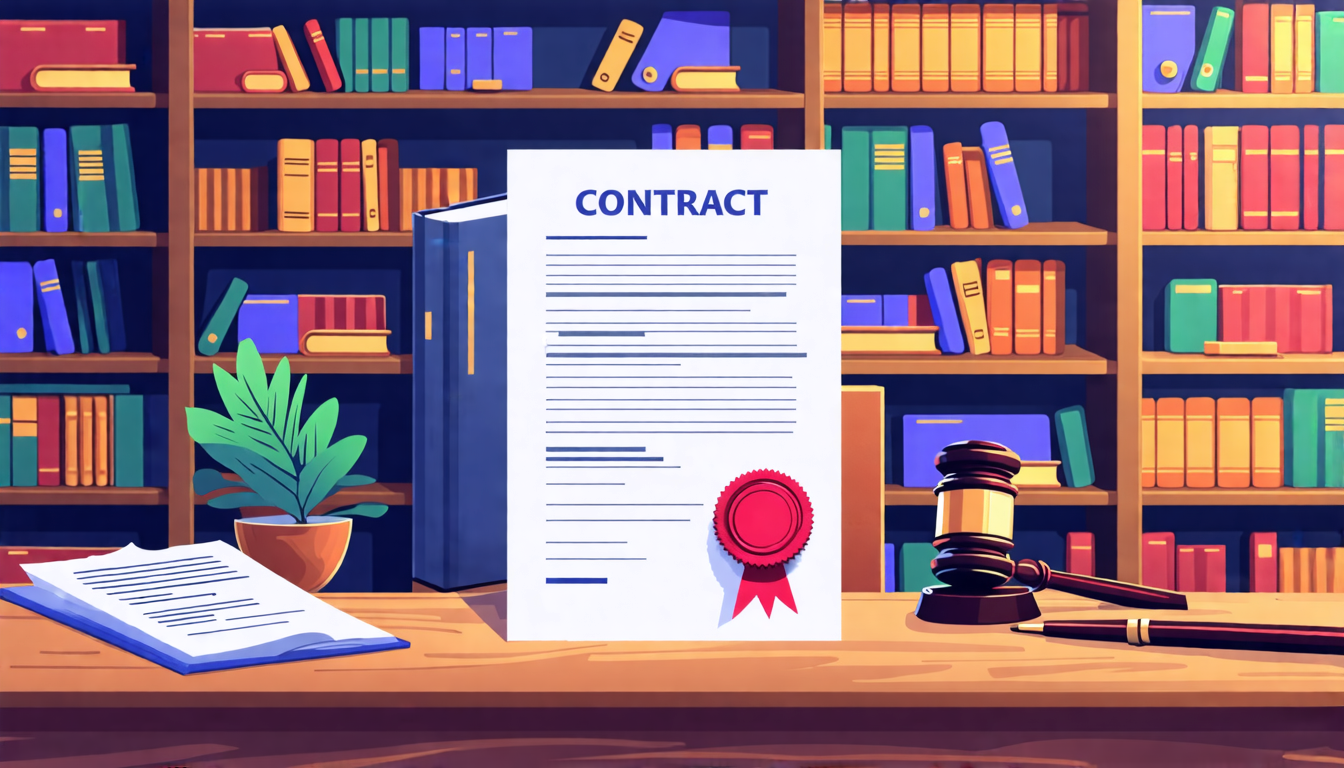In today’s complex business and legal landscape, understanding contract details is crucial for creating clear and effective agreements. Contract details encompass all the vital components that form the basis of legal and business contracts, such as the identification of parties, specific terms, defined obligations, and set conditions. Grasping these elements is essential not only to ensure that all parties have a mutual understanding but also to prevent potential disputes down the line. When contract details are thoroughly understood and meticulously set out, they provide a solid foundation for enforceable agreements. By incorporating a detailed analysis of contract details, you can safeguard your interests and ensure compliance with all legal stipulations. Whether you’re entering into a business deal or personal agreement, a comprehensive understanding of contract details will guide you through the intricate process, reducing the likelihood of oversights or misunderstandings. To fully master the essentials of contract details and further ensure the success of your agreements, professional consultation can be an invaluable resource, helping you navigate through any complexities that may arise.
Contract details are the foundational elements that form the backbone of any legal or business agreement. These details outline the specific terms and conditions agreed upon by the parties involved, ensuring that everyone has a clear understanding of their rights and responsibilities. The significance of contract details cannot be overstated, as they play a crucial role in maintaining clarity and preventing potential disputes. By understanding and meticulously reviewing contract details, parties can secure their interests and foster a harmonious partnership.
One of the primary reasons why understanding contract details is vital is because it guarantees that all parties are on the same page. Without clear contract details, misunderstandings and discrepancies can arise, which may lead to disputes or even legal battles. Therefore, being well-versed with these details allows parties to identify any ambiguities or omissions early on, thus avoiding complications in the future.
Clarity in contract details is essential not just for legal compliance but also for setting the tone and expectations of the business relationship. When contract details are comprehensive and accurately articulated, they provide a roadmap for how the agreement should be executed. This roadmap helps prevent confusion and sets clear boundaries and obligations that must be adhered to, ensuring a smoother transactional process.
Moreover, having robust contract details helps in enforceability. If a contract dispute does occur, detailed contract documentation serves as evidence of what was originally agreed upon by the parties. This documentation is pivotal in a legal setting, allowing for a straightforward resolution grounded in the terms outlined in the contract details.
To highlight the importance of contract details further, consider that well-drafted contract details can mean the difference between a successful and a failed business relationship. Effective contract details should include a comprehensive scope of work, timelines, payment terms, and measures for dispute resolution. Each of these elements promises the smooth deployment of the contract’s objectives and fosters a cooperative environment.
Thus, understanding contract details is indispensable for anyone entering into a formal agreement. By attentively examining these specifics, individuals and businesses can safeguard their interests and contribute to productive, long-lasting relationships. Keep in mind that overlooking the contract details could lead to miss out on crucial aspects, ultimately putting the success of the agreement at risk.

Key Components of Contract Details
When it comes to crafting a legally binding and enforceable agreement, understanding the key components of contract details is crucial. Each element plays a significant role in defining the scope, expectations, and responsibilities of all parties involved. Here’s a breakdown of the essential components that constitute comprehensive contract details:
1. Parties Involved
The first critical aspect of contract details is the explicit identification of the parties involved. This section should clearly define who is entering into the agreement. This typically includes full legal names, addresses, and any relevant contact information. Ensuring precision here can prevent ambiguities and ensure that all parties are adequately recognized and legally linked to the obligations and privileges enumerated in the contract.
2. Terms of the Agreement
The terms are central to any contract, establishing the framework for what each party is agreeing to. This includes defining the scope of work, timelines, pricing, and payment schedules. Clarity in the terms helps set expectations and prevent misinterpretations. Effective contract details here also bolster the enforceability of the agreement, as they provide a reference for what was originally agreed upon.
3. Obligations and Responsibilities
A key component of contract details is the delineation of obligations and responsibilities. This section should explicitly state what each party is expected to do and the standards they must meet. It’s essential that this part of the contract is as detailed as possible to minimize potential disputes over performance or failings in fulfilling contractual duties. Detailed contract details here can serve as a safeguard against allegations of non-compliance.
4. Conditions and Contingencies
Contracts should also account for various conditions and contingencies that might affect the fulfillment of the agreement. Incorporating these into your contract details provides a roadmap for handling unforeseen circumstances. Whether it’s a clause regarding changes in law, market conditions, or acts of God, these provisions help manage risk and ensure the agreement remains fair and balanced, regardless of changes in circumstances.
5. Termination Clauses
An often overlooked but crucial component of contract details is the termination clause. This outlines the conditions under which the contract may be ended by either party, with or without penalty. Crafting clear termination terms ensures that all parties understand their rights and obligations in exiting the contract, helping to prevent legal battles and financial losses.
6. Governing Law and Dispute Resolution
Identifying the governing law and dispute resolution mechanisms in contract details helps preempt potential legal conflicts. This section should specify the jurisdiction whose laws will apply and the preferred method of dispute resolution, whether through arbitration, mediation, or litigation. Effective contract details in this area can facilitate smoother, less contentious resolution processes.
7. Signatures and Execution
The value of a contract is ultimately validated through proper execution and signatures. The contract details should provide space for authorized signatures of all parties involved, along with dates. This formalizes the agreement and serves as tangible proof of consent to the terms laid out. Without these elements, the contract may be deemed invalid or unenforceable.
Understanding these key components of contract details is essential for drafting effective contracts. Not only do these elements establish a clear record of the agreement, but they also help mitigate risks and protect the interests of the parties involved. Make sure to thoroughly review these sections when preparing or negotiating your next contract to ensure a comprehensive and enforceable agreement.

How to Analyze and Verify Contract Details
Understanding the intricacies of contract details is crucial for both parties involved in an agreement, primarily to ensure that the contract is binding, enforceable, and accurately reflects the negotiated terms. Analyzing contract details demands a thorough approach to identify any potential issues, discrepancies, or ambiguities that might lead to disputes later. This section provides a structured guide to effectively analyze and verify the contract details.
Step-by-Step Guide to Analyzing Contract Details
Step 1: Thoroughly Read Through the Contract
The first and most critical step in any contract analysis is a comprehensive read-through of the entire document. Ensuring you understand the language and terms used is essential, as some contracts can contain legal jargon that might obscure certain details. Focus particularly on key contract details, such as the obligations of each party, payment terms, and duration of the contract.
Step 2: Identify the Parties Involved
Next, confirm that the details of all parties involved are accurate and complete. This includes names, business titles, addresses, and any identifiers like tax information or licensing details. Misidentification in this section can lead to enforceability issues, making these components some of the most critical contract details to verify.
Step 3: Evaluate Terms and Conditions
Each contract contains specific terms and conditions that outline the duties of each party. Assess whether these terms are clear and reflect the agreement accurately. Look closely for any terms that might have been written ambiguously or seem unusual. These can be potential red flags that need to be clarified before agreeing to the contract details.
Step 4: Examine Payment Terms
Properly stating the payment terms is essential in preventing future disputes. Ensure that the payment schedule, method, amount, and currency are clearly outlined. Examine clauses related to penalties for late payments or incentives for early payments to see how they might affect either party. Financial-related contract details need extra attention to prevent potential legal conflicts.
Step 5: Review Conditions and Penalties
A well-drafted contract will outline the conditions under which duties are to be performed and any penalties for failing to meet these conditions. Verify that these clauses match your expectations and that they are fair and reasonable under the circumstances. Ambiguous or harsh penalty clauses are among the contract details that often lead to disputes, so they warrant special scrutiny.
Common Pitfalls and Mistakes When Reviewing Contract Details
Avoiding mistakes is just as critical as understanding the contract. Here are some common pitfalls:
- Overlooking Clauses: Subsections or subpoints are often ignored, yet they can house significant contract details that alter the agreement’s meaning.
- Ignoring Boilerplate Language: Boilerplate clauses, often found in the latter part of contracts, might seem standard but can include troublesome terms that need adjusting.
- Not Accounting for Future Changes: Contracts should include a provision for amendments. Contract details that allow flexibility can often prevent misunderstandings later on.
- Failure to Double-Check Fact Information: Verify the accuracy of any factual information as mistakes here might compromise the integrity of the agreement.
Consulting Professionals When Necessary
Despite your due diligence, certain complexities in contract details might require a professional’s insight. Consulting a legal advisor can offer an additional layer of assurance, making sure all aspects of the agreement are compliant with applicable laws and industry standards. Contractual language can sometimes be misconstrued, and a professional’s eye helps in interpreting the legal intent behind these terms.
Regular consultation not only helps in understanding hidden risks but also in crafting more robust agreements in the future. Ultimately, trusting professionals to verify and navigate the detailed language of contracts is recommended, especially for high-stake agreements.
In conclusion, thoroughly analyzing and verifying contract details is a necessary step in safeguarding your interests and ensuring your agreements are both clear and enforceable. Employ these strategies and consider professional help if needed to navigate the complexities of contractual obligations confidently.
In conclusion, understanding the essentials of contract details is not merely a procedural step but a pivotal aspect of any legal or business agreement. Contracts, being legally binding documents, demand thorough scrutiny of their details to ensure they align with the parties’ intentions and protect their interests effectively. Mastery of contract details involves recognizing the key components such as the parties involved, terms, obligations, and conditions, each playing a critical role in safeguarding the contract’s enforceability and success.
To navigate contract details adeptly, one must adopt a comprehensive approach to analyze and verify them. This involves a meticulous examination of the document for accuracy, adherence to legal standards, and a thorough understanding of the obligations and conditions laid out within. Being mindful of common pitfalls, such as vague provisions or overlooked obligations, is crucial to prevent potential disputes.
Ultimately, while personal diligence in reviewing contract details is invaluable, the importance of professional consultation cannot be understated. Professional guidance can provide the nuanced understanding necessary to navigate complex contracts effectively, ensuring both accuracy and compliance. Whether you are drafting, reviewing, or finalizing a contract, maintaining clarity on every detail is key to fostering a robust and dispute-free agreement. By embedding a culture of thoroughness and precision in understanding contract details, individuals and businesses can fortify their legal foundations and enhance their agreements’ success and longevity.

